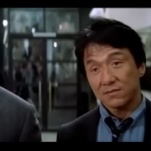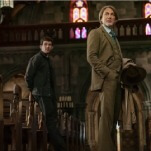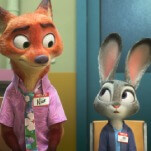Lone Star debuts tonight on Fox at 9 p.m. Eastern.
Lone Star is, hands down, the best network pilot of the year. It might be the best network pilot since Friday Night Lights. Remove Boardwalk Empire from the equation, and it pretty much stands alone, all by itself as the best of the year, no "network" qualifiers attached. It's confident, mature, ambitious television that doesn't feel the need to telegraph absolutely everything it does, that allows moments to play out in near silence as lead character Bob Allen (the wonderful discovery James Wolk) puzzles out just how he's going to keep the elaborate sham that is his life going. Its blend of influences is unexpected and surprisingly enjoyable, and it creates a host of instantly fascinating characters, all of whom are deeply, deeply flawed. But where Boardwalk Empire sent out six whole episodes to let critics know it was the real deal, Lone Star has yet to send out anything beyond the pilot. And the worst fear is that there's a very good reason for that. The worst fear is that Lone Star is a movie, not a television series.
Lone Star's central premise seems less and less elastic the more you think about it. Bob, a kind-hearted con man who's trying not to think too hard about the conscience he's developing, has been running a scam on the good people of Midland, Tex., for several years now. His pushy fellow con man father (played with subdued menace by character actor David Keith) is trying to get him to pull out before the citizens of Midland can learn the truth about Bob, which they are dangerously close to doing. But Bob's not leaving because he's fallen for the comely Lindsay (Eloise Mumford).
Why's dad so keen on getting out? Because Midland's been milked dry, and he's intent on a new project, clearing out the bank accounts of a wealthy Houston oil family, led by patriarch Clint Thatcher (Jon Voight, doing what Jon Voight does best). Things have grown complicated here as well because, well, Bob's fallen for the woman he married to ingratiate himself to Clint, Clint's daughter Cat (Adrianne Palicki). Bob makes a series of big decisions in the last five minutes of the pilot, and they send the episode out on a terrific high. But they also feel like a series of decisions made right around the hour mark of a movie. It's not immediately clear how any of this is going to play out in episode after episode for seasons to come. It's not immediately clear how any of this is going to play out for 22 episodes. It's not even clear how it might play out in the second episode.
But if any blend of writers, directors, and producers is going to find a way out of the old "this should be a movie" trap, it's the group behind this series. The creator is Kyle Killen, a fiction writer who caused a big stir throughout Hollywood with his first sold screenplay, The Beaver. Killen's a TV show neophyte, but he has an almost instinctual grasp of when to show and when to tell that serves him well in the pilot. Naturally, Fox was hesitant to let a novice writer run its sole new fall drama series, so it hooked Killen up with two veteran TV producers, Christopher Kyser and Amy Lippman, who created and ran Party of Five, a surprisingly heartfelt little show that eventually drowned under its own excess (though its first three seasons were very good indeed). The pilot's director, who set the visual tone for the series, is 500 Days of Summer director Marc Webb, who takes Killen's visually oriented script and does beautiful things with it, paring down many of Killen's ideas into potent symbols.
It's the mash-up of Killen with the team of Kyser and Lippman that holds the most promise here. What Killen is trying to do in the pilot for Lone Star is simple: He's trying to mesh the sharp character work and complicated moral tone of cable dramas like Mad Men and Breaking Bad with the tropes of the primetime soap, a mostly moribund genre due for a comeback. Basically, the show he's come up with is Dallas if it took a left turn through Sopranos-ville, and while no one on the show is as morally complicated and questionable as Tony Soprano or Don Draper, Killen is not afraid to back away from the bad things they do. The promotion for the show has focused almost entirely on the show's soapier, more salacious elements, but Killen's script and Webb's direction underplay them throughout, trying to insist that a con man who's juggling two women and two giant cons at once is the most realistic thing in the world. If this thing is going to work as a series, though, Kyser and Lippman are going to have to bring all of the lessons they learned about running an understated primetime soap with a potentially constraining premise to bear.
Even if the series from here on out bombs, there's something to be said for a wonderful pilot, and everyone involved with Lone Star has made a great one. It's worth watching for the moments of understatement Killen and Webb deploy skillfully. There's a keychain that Lindsay gives Bob early in the episode as a joke, and the pilot uses that keychain so perfectly, to mean so many things, that every time the camera returns to linger on it, it feels like a completely different keychain from the one it was before. Similarly, the camera doesn't call attention to Bob's wedding ring on his finger when he arrives at the house he shares with Kat. It's simply a small background detail for the audience to pick up on, if they want. And when Bob hangs up with Lindsay to go and resume his life with Cat, Killen and Webb find a wonderful visual metaphor – two pairs of wallets and cell phones rubber-banded together, scruffier models for his life with Lindsey and sleeker ones for his life with Cat. Better still, none of this is overplayed. Killen and Webb trust us to keep up when zeroing in on that keychain or on one of those wallet-and-cell-phone sets.
No pilot is perfect. All pilots get bogged down by clunky exposition and bad dialogue here and there. Not even Lone Star is exempt (though the cast is so good that even the worst lines pass by smoothly). But this is as close to a pilot that doesn't miss a step as network TV gets. This is bold television making that doesn't hesitate to aim high for things that it might not pull off, that realizes that if it's going to flop, it may as well flop spectacularly. Sure, one could quibble with how omnipresent gentle folk rock is on the soundtrack or with how the pilot tries a little too hard to underline that Bob is a bad man who's having stirrings of conscience, particularly at an overwritten scene at a backyard barbecue. But these quibbles would be missing how much this pilot has to lay out there for the audience and how skillfully it does so.
Being a TV critic is as much about being a soothsayer as anything else. And every year, there's a great pilot that makes any viewer want to get on board for the series to come, only to sorely disappoint over the next few weeks. There's every possibility that Lone Star will be this year's model. But where it's easy to be cynical about the show's possible avenues (especially when seeing how many seem closed off), let's, instead, hope that all involved have found a way to burst through the walls that seem to be constraining them. Because once they do, there'll be nothing quite like this on TV, a show with head, heart, and ambition to rival a blue, Texas sky.








































